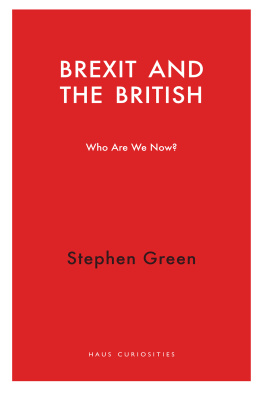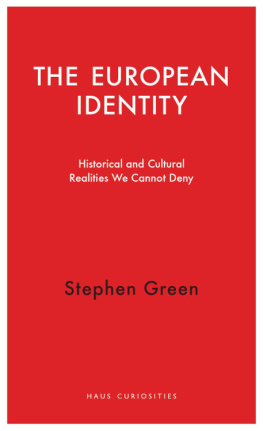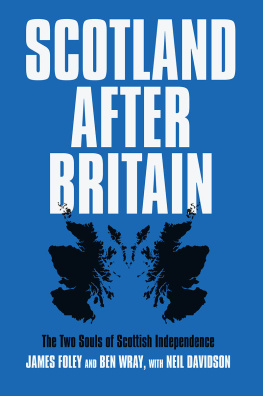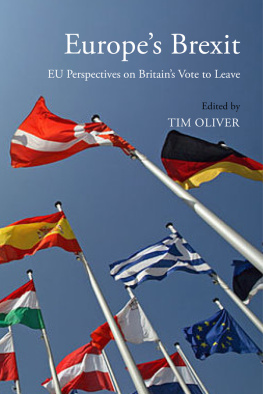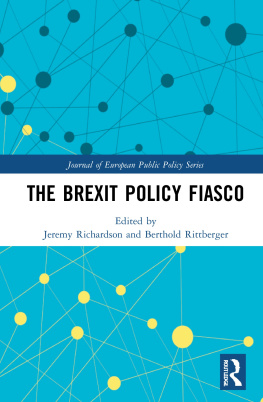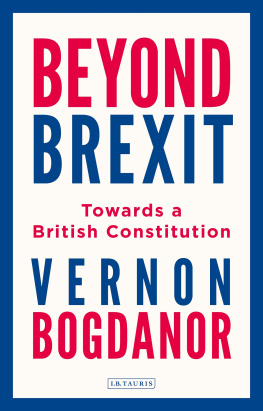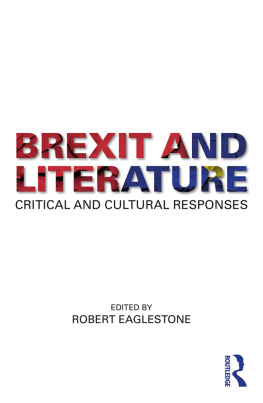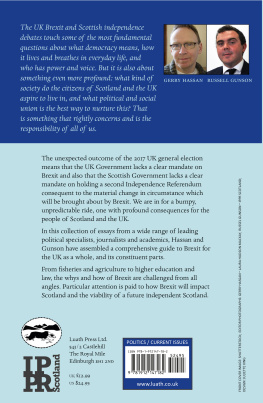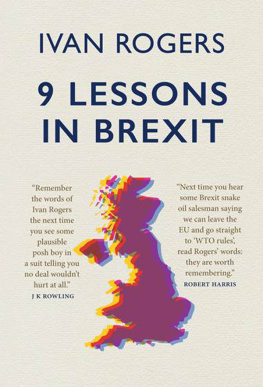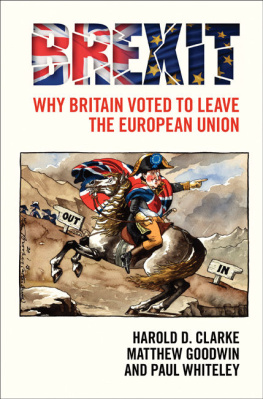First published by Haus Publishing in 2017
70 Cadogan Place
London SW1X 9AH
www.hauspublishing.com
Copyright Stephen Green, 2017
The right of the author to be identified as the author of this work has been asserted in accordance with the Copyright, Designs and Patents Act 1988
A CIP catalogue record for this book is available from the British Library
ISBN: 978-1-910376-71-3
eISBN: 978-1-910376-72-0
Typeset in Garamond by MacGuru Ltd
Printed in Spain
All rights reserved
The shock and its aftermath
It feels like a long time now since I woke up very early on the morning after the Brexit vote in June 2016. My wife had made the mistake of looking at the news. She crept out of the bedroom to go downstairs, and in so doing she woke me up. I realised instantly that something had happened. So I looked at my phone and saw what she had seen. It was around 4 oclock still dark on one of the shortest nights of the year and by then the result was clear. The news of the 5248 result was a shock and sleep vanished instantly. I remember noting that at least it was a clear-cut result, even if it was not the one I had wanted or expected. I followed my wife downstairs, where we sat and watched the events unfold on the television. Much has happened since then; but still it is one of those moments like a birth or a death in the family that we will remember for the rest of our lives.
Over the following days, the mood amongst Remainers was a swirling mix of disbelief, dismay and anger. Even the Leavers seemed surprised. It became clear very quickly that few if any of the Leave campaigners had much idea of what Brexit would mean in specifics. Few people in either business or government had much idea either. The markets had clearly been assuming it would not happen hence the very sharp fall in sterling, which had been driven up strongly in advance. The online betting market had made exactly the same mistake. I had gone to bed on the day of the vote thinking it would be close but that the Remainers had the edge: even the prominent Leavers interviewed on the television that evening seemed braced for a narrow loss.
For a while, some Remainers, who seemed to become more passionate in defeat than they had been at any stage in the campaign, pinned their hopes on an online petition for a new referendum. This gathered over four million signatures over the weekend remarkable enough, but nowhere near what would have been needed to convince government or parliament of the need for a rerun or simply to ignore the result. The fact was that more people in Britain had voted to leave the EU than had ever voted for anything. A few went on hoping that it might not in the end come to an actual Brexit; that some new grand bargain, which in effect changed the nature of the EU, would allow continued participation in the European project on some basis more acceptable to the British people. More generally, though, there was little sign of buyers remorse. Some Leavers might have been nervous about whether they had done the right thing by their children (as one father of a nine-yearold confessed to me). But not many. Most people, Leavers and Remainers alike, began to get used to a new reality, even while they were unsure what final form it would take. And many were lulled by the unexpectedly robust performance of the economy in the months after the vote. The sky had not fallen in.
And then Article 50 was triggered; Britain began to gear up, psychologically and administratively, for what lay ahead the phoney war was over. Some have continued to exude confidence and optimism because they believe that rational self-interest will ensure a good result from the negotiations or because they are whistling in the dark. Some feel the energy of excitement; for them, Britain had now voted to enter a brave new world. Others are stoic but quietly nervous, kept awake at night by the sheer complexity of the task. And most have become reconciled to the thought that it could take years to sort out all the intricacies of a new relationship between Britain and the EU. Increasingly, the Remainers have focussed on the longer term: Britain will, they argue, find out that the gravitational pull of a unified Europe on our medium-sized nation is too strong.* But the biggest question Britain has posed itself since the Second World War remains open: can the British find a reasonable modus vivendi with their European neighbours, at the same time as building new and exciting relationships in the wider world?
We shall see. Much of the campaigning before the vote had been a cacophony of exaggeration and lies, some of which rankled deeply and which badly wounded many relationships in the rest of the EU and indeed beyond. In the last analysis, the Remain campaign was hobbled throughout because no one could plausibly deny that the EU was (and is) in need of radical reform. This made any simple and straightforward defence of the status quo difficult.
And virtually nobody was prepared to argue that a European identity was a fundamental element in a modern British self-awareness, to be celebrated and valued as such. In fact, much of the debate was dominated purely by economic calculations: both sides argued at length in terms of the costs and benefits of membership of the EU relative to alternative trade strategies, and about the costs of disruption involved in leaving it. Projections were batted back and forth, often with spurious precision, as if anyone could plausibly quantify the difference between alternative visions of Britains economic performance ten or twenty years ahead.
Yet those arguments were not what carried the day. The real debate was about the stranger in our midst. Londoners might be relaxed about or even delight in living in Babel, and the Remainers argued in terms of the economic benefits of immigration. The Leavers, on the other hand, found angry resonance when they conjured up the demons of uncontrolled immigration. All in all, one side appeared to lack much conviction; the other was full of passionate intensity. And this was a binary affair: there was no centre to hold.
Not much in all this did justice to the complexity of the case for or against membership of the EU a case which was inevitably multilayered. It involved questions about sovereignty: can it be shared, or is parliamentary sovereignty with all its history sacrosanct and supreme? It involved issues of migration and border control, in what is one of the most crowded countries in the world. It involved issues about commercial trade offs: how important to British exports was membership of the Single Market, and how easily could Britain negotiate a suite of trade agreements with the rest of the world? And there were issues of geopolitics: is NATO sufficient for Britains geopolitical security, or was membership of the EU necessary to ensure that the British voice continued to have influence?

